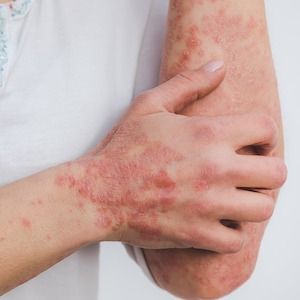Skin Disease Shown to Significantly Impact Daily, Work Lives Among Patients in Europe
This new data on the negative impacts of skin disease on individuals in 27 countries in Europe demonstrates the lasting impacts of stigmatization.

Around half of individuals with a single skin disease report their condition being embarrassing in their work and personal life, according to a new analysis of the European general population, with sleep disturbances being prevalent for 30%–50% of those with psoriasis, rosacea, acne, atopic dermatitis, or urticaria.1
These new findings and more resulted from an analysis of patients with skin disease from 27 different countries in Europe, conducted to assess the burden of the most frequent dermatological conditions in adults in the region specifically with regard to life quality, work life, and stigma.
The investigators involved in the analysis acknowledge the existence of recent, large-scale studies assessing skin disease burden among those recruited in hospitals or clinical centers.2 They sought to look at those who have not undergone clinical consultations, with the research being led by Paolo Gisondi, from the Section of Dermatology and Venereology at the University of Verona’s Department of Medicine in Verona, Italy.
“The aim of the present study was to evaluate the burden of the most common dermatological diseases of adult patients across Europe, in terms of impact on quality of life, work life, and stigmatization,” Gisondi and colleagues wrote.
Background and Findings
The investigators conducted a multinational, cross-sectional study, and their research was a part of the European Academy of Dermatology and Venereology’s (EADV) population-based survey on 'Burden of skin diseases in Europe.' They gathered information from a representative sample of European adults 18 or older in 27 total countries.
The team’s collection was undertaken utilizing a web-based questionnaire that they had implemented from November 2020 to August 2021. They used proportional quota sampling with a replacement design, and this was based upon sex, age, administrative area, patient environment, and patient income. Luxembourg, Cyprus, and Malta were the only countries on the continent excluded as a result of their minimal representation of its population.
Subjects were included by the investigators if they reported at least a single disease or skin issue of some kind within the prior year. Screening for skin cancers as well as mole examinations were not included by the team, and subjects noting skin-related sensations without a disease were not looked into.
In instances where participants had several different skin diseases, the team asked them to address the most notably bothersome condition. Dermatology-related quality of life was examined by the investigators using the Dermatology Life Quality Index (DLQI), consisting of 10 items with a four-point scale.
Both anxiety and depression’s presence were looked into by the research team, with questions having 3 response options. Specific inquiries by the survey looked at subjects’ daily lives, feelings of stigmatization, and the overall results of skin disease on their work and personal lives.
Ratings related to participants’ personal and work lives were determined through the use of a 4-point measurement scale, with a spectrum from 'not embarrassing' to 'very embarrassing.' The team measured subjects’ stigmatization feelings by questions related to feelings of disgust, rejection, and being refused access to leisure activities.
Overall, the research team looked at data from a cohort of 19,915 subjects, and 44.7% of them were noted as being male. Approximately half of the subjects with reported cases of alopecia, acne, or chronic urticaria, and around 40% of ones grappling with skin cancers, eczema, or psoriasis, were found to have expressed a substantial or extremely substantial impact of their issues on life quality.
The team noted that those with hidradenitis suppurativa (HS) and reported sexually transmitted diseases (STDs) reported a substantial decline in their life quality. In a broader context, an immense 88.1% of the subjects reported their skin condition to be embarrassing in their personal lives, with 83% reporting such an effect on their professional lives.
Around half of the study participants noted challenges with their sleep, greater fatigue, and difficulties in self-care due to their skin condition. With regard to feelings of stigmatization, the investigators reported that 14.5% of them stated they felt rejected by others and this was linked to their skin ailment.
Lastly, the research team noted that 19.2% stated they had experienced looks of disgust. Both anxiety and depression were noted as common among participants over each of the different skin diseases.
“In conclusion, our study highlights the psychosocial burden experienced by people with skin diseases, and the need to address their impact on quality of life and stigmatization in the context of patient management,” they wrote. “In particular, the impact on work life highlights the need of an early intervention, in order to avoid consequences on the patients' life course.”
References
- Gisondi, P, Puig, L, Richard, MA, Paul, C, Nijsten, T, Taieb, C, et al. for the EADV Burden of Skin Diseases Project Team. Quality of life and stigmatization in people with skin diseases in Europe: A large survey from the ‘burden of skin diseases’ EADV project. J Eur Acad Dermatol Venereol. 2023; 37(Suppl. 7): 6–14. https://doi.org/10.1111/jdv.18917.
- Dalgard FJ, Gieler U, Tomas-Aragones L, Lien L, Poot F, Jemec GBE, et al. The psychological burden of skin diseases: a cross-sectional multicenter study among dermatological out-patients in 13 European countries. J Invest Dermatol. 2015; 135: 984–91.